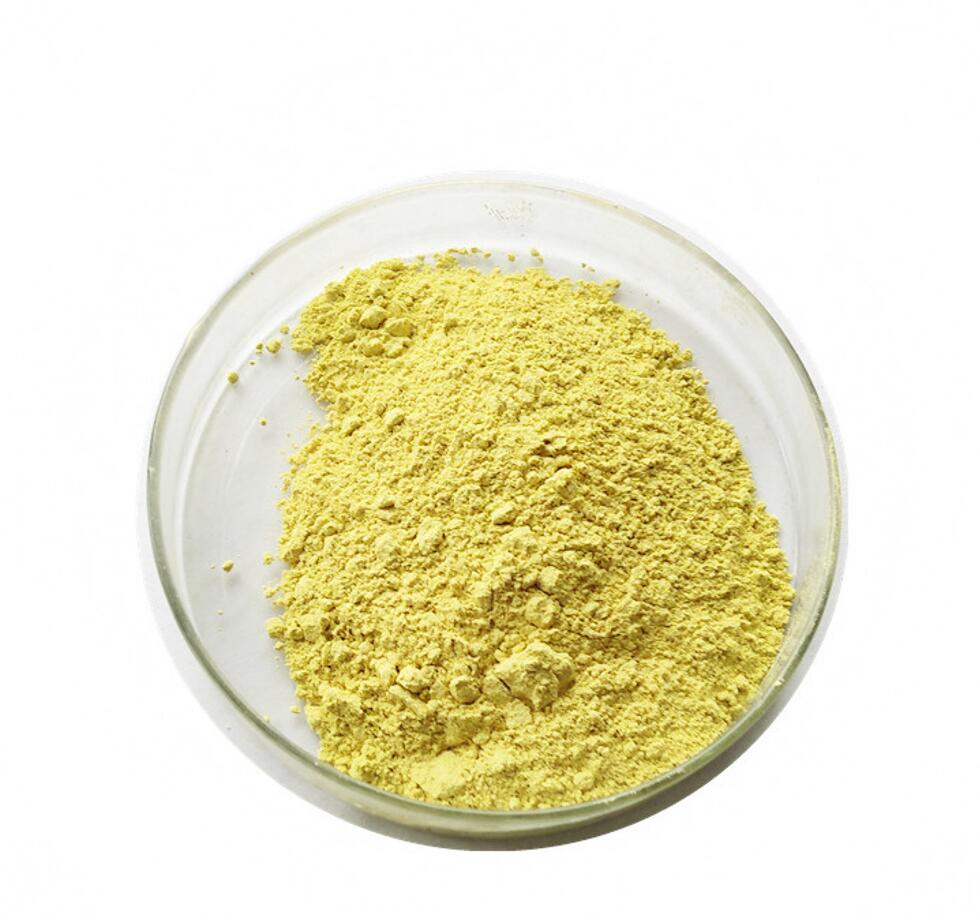Fisetin Plant Powder
Chemical Name | Fisetin |
CAS Number | 528-48-3 |
Synonyms | Fisetin Extract, Smoke Tree Extract, Boxwood Extract, Cotinus Extract, Tetrahydroxyflavone |
Molecular Formula | C15H10O6 |
Purity | 98% min |
Appearance | Yellow Crystal Powder |
Solubility | Soluble in methanol and ethanol, not soluble in water |
Application | Food supplement and Medicine |
Description of Fisetin Powder
What is Fisetin Powder
Plant base Fisetin Powder, also called Boxwood Extract or Smoke Tree Extract, is a naturally occurring flavonoid polyphenol found in various fruits and vegetables, such as strawberries, apples, grapes, and cucumbers. It exhibits various activities, including neurotrophic, antioxidant, antiinflammatory, and antiangiogenic effects. Fisetin powder is commonly used in dietary supplements, skincare products, and pharmaceuticals due to its bioactive nature and therapeutic potential.
Princeton Powder is a leading supplier of bulk pure Fisetin ingredient in USA. Buy the non-GMO Boxwood Extract in good quality and competitive prices.
COA of Fisetin Powder
ITEM | SPECIFICATION | METHOD |
Appearance | Yellow-Green Powder | Visual |
Odor | Characteristic | Organoleptic |
Taste | Characteristic | Olfactory |
Bulk Density | 50-60g/100ml | CP2015 |
Particle Size | 95%-99% through 80 mesh | CP2015 |
Fisetin | ≥98% | HPLC |
Loss on Drying | ≤1.0% | CP2015 |
Ash | ≤1.0% | CP2015 |
Total Heavy Metals | ≤10 ppm | CP2015 |
Cadmium (Cd) | ≤1 ppm | CP2015(AAS) |
Mercury (Hg) | ≤1 ppm | CP2015(AAS) |
Lead (Pb) | ≤2 ppm | CP2015(AAS) |
Arsenic (As) | ≤2ppm | CP2015(AAS) |
Aerobic Bacterial Count | ≤1,000 cfu/g | CP2015 |
Total Yeast & Mold | ≤100 cfu/g | CP2015 |
Escherichia Coli | Negative | CP2015 |
Salmonella | Negative | CP2015 |
Staphlococcus Aureus | Negative | CP2015 |
Benefits/Application of Fisetin Powder
Dietary Supplements: Fisetin is often consumed as a dietary supplement due to its potential health benefits. It is believed to support overall health and wellness by acting as an antioxidant that helps protect cells from oxidative stress.
Anti-Aging Skincare: Fisetin is incorporated into skincare products for its antioxidant properties, which can help protect the skin from environmental damage and reduce signs of aging such as wrinkles and fine lines.
Neuroprotection: Research suggests that fisetin may have neuroprotective effects, potentially supporting brain health and cognitive function. It is studied for its possible role in preventing neurodegenerative diseases like Alzheimer’s and Parkinson’s.
Anti-Inflammatory Effects: Fisetin has been investigated for its anti-inflammatory properties, which may help reduce inflammation in the body and support joint health.
Cancer Research: Some studies have explored fisetin’s potential anticancer properties, although more research is needed in this area. It is believed to have apoptotic and anti-proliferative effects on cancer cells.
Fisetin Reference
An Insight of Polyphenols in Lung Cancer Chemoprevention
- Fisetin, chemically known as 3,3′,4′,7-tetrahydroxyflavone, is one of the naturally occurring flavonoids with occurrence in strawberry, cucumber, grape, persimmon, apple, and onion. It is reported to possess apoptotic, antiproliferative, and antiagiogenic properties in cancer research
Polyphenols in the Prevention and Treatment of Vascular and Cardiac Disease, and Cancer
- Various flavonoids, such as apigenin, baicalein, cyanidin, fisetin, galangin, hesperetin, luteolin, myricetin, naringenin, phloretin and quercetin, have been described as quite potent inhibitors of DNMT activity although their gene promoter demethylating activity was not confirmed.
Fisetin: A Dietary Antioxidant for Health Promotion
- In general, botanical antioxidants have received much attention, as they can be consumed for longer periods of time without any adverse effects. Flavonoids are a broadly distributed class of plant pigments that are regularly consumed in the human diet due to their abundance.
Strawberries are the best source of fisetin, but scientists colloquially suggest you’d need to eat 37 strawberries to get an adequate dose. The next best sources of fisetin are mangoes and cucumber with the skin left on; it can also be obtained from apples, persimmons, kiwi, peaches, grapes, tomatoes, and onions.
Cited: New Plant Compound From Strawberries May Prevent Alzheimer’s And Memory Loss
Fisetin is a more powerful senolytic than quercetin. And it works on its own, without the potential side effects of cancer drugs. A cell study published in the journal Aging showed that it eliminated about 70% of senescent cells—while doing no harm to healthy, normal human cells.
Cited: Fisetin: A Senolytic That Extends Life – Life Extension
Fisetin, as one member of the Flavanoids family, is water-soluble compounds found in plants and have antioxidant properties.

